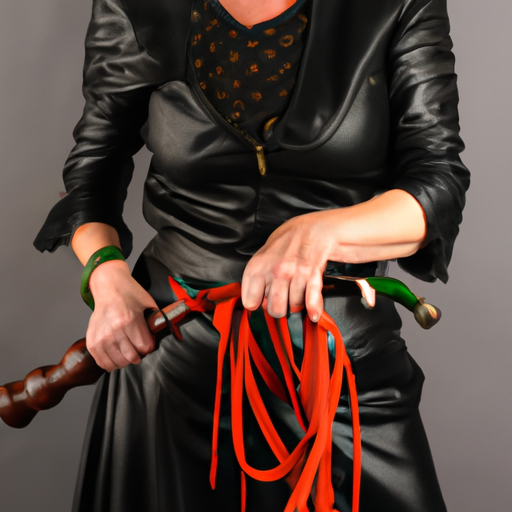In today’s society, there are numerous misconceptions and stereotypes surrounding dominatrixes. These powerful individuals, like Mistress Sofia, are often misunderstood, leading to a lack of awareness and acceptance. In this blog post, we aim to shed light on some of the most common misconceptions about dominatrixes, challenging these stereotypes and encouraging a more nuanced understanding.

Misconception 1: Dominatrixes are solely interested in sexual activities.
One of the most prevalent misconceptions is that dominatrixes are only focused on sexual activities. While it is true that BDSM (Bondage, Discipline, Dominance, Submission, Sadism, Masochism) relationships may involve a sexual component, it is crucial to recognize that dominatrixes provide much more than just sexual gratification. They offer a safe space for exploration, empowerment, and personal growth. Many individuals seek the guidance of a dominatrix to explore their desires, challenge their limits, and embrace their authentic selves.
Misconception 2: Dominatrixes are abusive or violent.
Contrary to popular belief, dominatrixes are not abusive or violent individuals. Consent and communication are the foundation of any BDSM relationship. Dominatrixes prioritize the well-being and safety of their submissives, establishing clear boundaries and engaging in consensual acts. They employ a range of techniques, including bondage, role-playing, and psychological domination, to create a controlled and consensual environment. It is essential to understand that the power dynamic in BDSM relationships is consensual and negotiated, with both parties actively participating and deriving pleasure from the interaction.
Misconception 3: Dominatrixes lack agency and are oppressed.
Another misconception is that dominatrixes lack agency and are oppressed by their profession. However, this assumption fails to recognize the autonomy and empowerment that dominatrixes experience. Many dominatrixes actively choose this profession as a means of personal expression, embracing their dominant desires and finding fulfillment in guiding others. They often undergo extensive training and education to ensure they possess the necessary skills and knowledge to create a safe and consensual environment. Dominatrixes are strong, confident individuals who take control of their own lives and empower others in the process.
Misconception 4: Dominatrixes are only sought out by men.
While it is true that the majority of clients seeking the services of dominatrixes are men, it is important to note that individuals of all genders and sexual orientations can engage in BDSM activities. Dominatrixes cater to a diverse range of clients, including women, couples, and individuals from the LGBTQ+ community. BDSM is a personal and individual journey, and dominatrixes are there to support and guide anyone who seeks their expertise.
Misconception 5: Dominatrixes are morally wrong or unethical.
Perhaps the most significant misconception surrounding dominatrixes is the belief that their profession is morally wrong or unethical. However, it is crucial to recognize that BDSM activities are consensual and mutually enjoyable for all parties involved. As long as there is informed consent, respect, and communication, BDSM relationships can be a healthy and fulfilling expression of sexuality. It is essential to approach BDSM with an open mind, free from judgment or preconceived notions.
In conclusion, it is imperative to challenge the misconceptions surrounding dominatrixes like Mistress Sofia. By understanding the true nature of BDSM relationships, we can foster a more accepting and inclusive society. Dominatrixes provide a valuable service, facilitating personal growth, exploration, and empowerment. It is time to move beyond the stereotypes and embrace a more nuanced understanding of their role in our society. Full Article.
What are some positive ways to explain why someone doesn’t enjoy the job of a Headmaster-Mistress?
In today’s world, where professional satisfaction is highly valued, it is not uncommon for individuals to find themselves in job roles that do not align with their passions or interests. One such job that often presents unique challenges is that of a Headmaster or Headmistress. While this role may hold immense responsibility and prestige, it is important to acknowledge that not everyone may find enjoyment in it. In this blog post, we will explore some positive ways to explain why someone may not enjoy the job of a Headmaster or Headmistress.

First and foremost, it is crucial to understand that each individual has their own set of strengths and preferences. The role of a Headmaster or Headmistress requires a diverse skill set, including leadership, organization, communication, and administrative abilities. However, some individuals may find that their true passions lie in different areas, such as teaching, counseling, or creative pursuits. It is important to respect and acknowledge these differences, as they contribute to a diverse and well-rounded workforce.
Furthermore, the job of a Headmaster or Headmistress often comes with a significant amount of stress and pressure. The responsibility of overseeing an entire educational institution, managing staff, ensuring the well-being of students, and dealing with administrative tasks can be overwhelming for some individuals. The constant demands and expectations placed upon them can lead to burnout and a lack of enjoyment in the role. It is essential to recognize the toll that this level of responsibility can have on one’s mental and emotional well-being.
Another aspect to consider is the limited freedom and flexibility that may come with the position of a Headmaster or Headmistress. These roles often require individuals to adhere to strict guidelines, policies, and procedures set by the educational institution or governing bodies. While these rules are put in place to ensure the smooth functioning of the institution, they may restrict the autonomy and creativity of the Headmaster or Headmistress. This lack of freedom can be demotivating and may result in a diminished sense of enjoyment in the job.
Moreover, the role of a Headmaster or Headmistress often involves dealing with conflicts and challenging situations. From managing disciplinary issues to addressing parental concerns, these individuals are constantly faced with difficult decisions that may not always be well-received. This can lead to a high level of stress and emotional exhaustion, further impacting one’s enjoyment of the job. It is important to acknowledge the emotional toll that such situations can have on individuals and provide them with the necessary support and resources to navigate these challenges.
In conclusion, there are various positive reasons why someone may not enjoy the job of a Headmaster or Headmistress. It is imperative to respect individuals’ unique strengths, preferences, and passions while understanding the pressure, limited freedom, and challenging situations that come with this role. By recognizing and addressing these factors, educational institutions can create a supportive and inclusive environment that values the well-being and job satisfaction of all its employees.